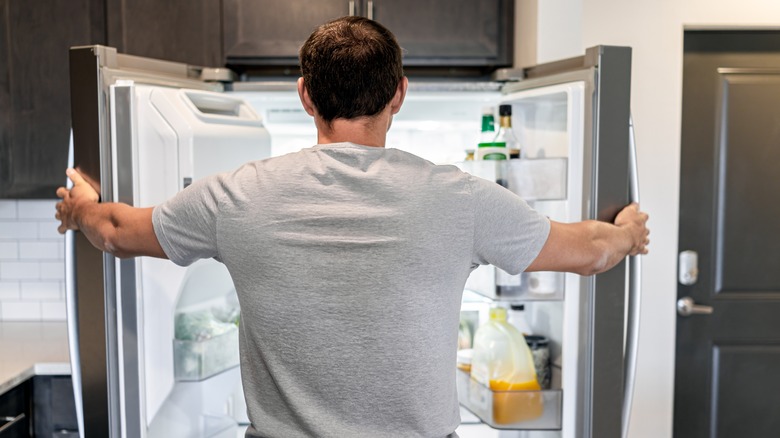So, Refrigerators Can Actually Explode
Of all the struggles that come with being an adult, you've likely never considered your fridge could explode. It probably never crossed Lenore Satterthwaite's mind either, yet that's what happened earlier this month. According to ABC 11, the Frigidaire-branded refrigerator was less than a year old, and it was checked out just a few days earlier after it began making a noise. "I just thought it was an earthquake, big explosion," she said, stating she found "doors on the floor" and "holes in the wall" when she entered the room. Though nobody was injured, the explosion caused damage to surrounding appliances and fixtures. The Person County Fire Marshall responded, but they couldn't identify the cause.
A similar incident occurred in California the year prior, when a refrigerator "[blew] out from all sides," according to California fire Captain Andy Jones (via ABC 7 News). The nature of the explosion indicates it came from inside the refrigerator itself. "One of the residents here was asleep on the couch; she said all she heard was a loud boom, glass breaking and she ran outside," Jones said.
As obscure as it sounds, there is actually a reason this occurs, and there are ways you can prevent it if you act proactively. You don't want to make one of the mistakes everyone makes with their refrigerator.
Maintenance can save your fridge from disaster
The answer to exploding fridges is ironically the thing that makes them work. The compressor, which is essential to keeping your groceries cold, utilizes gas refrigerant that runs the risk of becoming trapped, which, in turn, prohibits the gas from properly venting. This happens when the compressor's coils contract.
If you're diligent with maintenance, there are ways to prevent — or at least predict — a possible explosion. Per a Sears appliance expert, Wayne Archer, your fridge may trade its signature humming sound for a choppier sound when it's time to clean your compressor's coils (via Realtor.com). This happens more commonly with old refrigerators, though that wasn't the case for the aforementioned North Carolina resident.
In order to clean your compressor coils, you'll want to read your refrigerator's manual to find where they're located in your model. Position the fridge so they're easily accessible, and unplug the appliance before you begin to work. Then, use a small vacuum followed by a toothbrush, or something of the sort, to remove any problem-causing dust. Just make sure you plug it back in, or you might lose your leftovers in the fridge.

